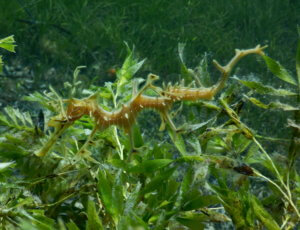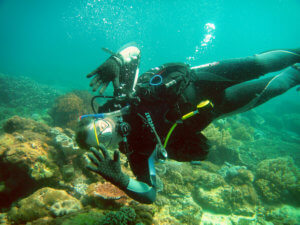When we think about the importance of oceans, many of us would describe the awe-inspiring wildlife or the physical assets we get from them but what about the feeling of contentment when you arrive at the beach on a perfect day or the thrill of catching the perfect wave?
There’s no denying the oceans also provide us with an array of resources and services that are essential for all life on earth, including the wellbeing of humans. From the air we breathe to the food on our plates and even the medicine in our cabinets, the oceans provide us with resources we simply cannot live without.
At the start of this century, nations around the world collaborated to put together a list of all the ways our environment looks after us. The resulting document, the Millennium Ecosystem Assessment, describes and categorises all the different ways people receive these benefits, and shows how much our oceans punch above their weight in providing for us!

Leafy Dragon at Rapid Bay, South Australia
Understanding the benefits our oceans provide
There are four main types of ecosystem services: supporting, regulating, provisioning and cultural.
Provisioning services can be thought of as our physical assets – these include the materials we use to build or the food we eat or drink. Our oceans, in particular, provide us with food to eat with over 40 % of people getting their necessary protein from the ocean. Throughout time, we’ve used limestone produced by corals to build our bridges and homes, taken salt to spice up our food, and extracted raw materials to use in everything from construction to cosmetics. Marine creatures have provided us with over 20,000 new biochemical substances which may prove to help us treat ailments and diseases including asthma, cancer, and chronic pain.
Regulating services provided by the ocean ensure the stability and sustainability of all life – by circulating heat around the globe they create our climate, and these shifting currents also continuously move and replace gases – including oxygen – between our land and atmosphere.
Supporting services are the chemistry behind ecosystems. Phytoplankton in the oceans provides half the oxygen we need to breathe! Millenia of wave actions erode cliffs and bury minerals in the depths, to be turned into rock and returned to the surface through volcanoes millions of years later. Countless tonnes of carbon sinks to the abyss in the life cycle of marine animals – an example of carbon “sequestration” that is now increasingly more important to help mitigate climate change.
All of these services support our lives and even our lifestyles. But none of them really capture what the oceans mean to each of us, do they, fellow ocean lovers? Economists and developers may look at the environment around us as simply a background for whatever they are doing in their day to day lives, but there are things about the ocean that we know make us who we are, that can’t be summed up in chemistry or raw materials.
Cultural services aim to describe the feelings the ocean gives us, the pleasure of swimming, or surfing, viewing a whale from a boat, going sailing, birdwatching, or attending beach festivals – these are the recreational, aesthetic and spiritual services we receive from the ocean- and they are extremely important to our health and wellbeing.
Pricing the invaluable
A growing field of research has started describing just how important to us these intangible benefits are, but assessing the value of cultural services is difficult and has tended to focus on marketable services such as tourism. This is unfortunate, as cultural ecosystem services present very compelling reasons for ecosystem conservation. Some studies even consider cultural services to be a fundamental component of all conservation, because they describe “what makes us human in the landscape”.
For example, several studies around the world have found people may identify with, even boast about their natural surroundings, and that the mere presence of a known and loved environment can contribute to their social relationships and educational values. One participant summed this up when she said that even though she does not visit the landscape site often, “just knowing that it was there” made her happy.
What we now know is that our natural world is part of each of our sense of place. Much more than a feel-good, fuzzy concept, sense of place is the sum of our experiences and activities, our friends and family, our very identity. Importantly, it describes how connected we feel to our environment and each other, as research has shown that healthy environments can lead us to feel content – they build a positive sense of identity and give us security about our place in the world.

How marine parks protect what makes us human
Coastal and marine areas have always attracted people to live or visit – there’s no doubt that being by the coast offers us something we need. But the ability for marine environments to continue to provide for those needs- whether provisioning, regulating, supporting, or cultural – depends on their overall health and biological functionality.
Traditionally, the fundamental purpose of marine protected areas (aka marine parks) has been to conserve the biodiversity of an area, but they also protect our cultural resources. A marine protected area can be thought of something like a “city plan” on the water – when they’re created, they provide for all the different activities that our communities gain benefit from the ocean through allocation of zones. For example, a fully protected sanctuary zone will protect essential habitats like oyster reefs that filter water (supporting) or mangroves that buffers against storm surges (regulating). Whereas a general use zone allows anglers to catch fully grown fish home to take home to feed the family (provisioning, and cultural). What’s exciting is the more communities support marine parks and participate in their creation and maintenance, the greater the biological AND cultural benefits they see!
As research continues to identify more and more ways in which the ocean provides us with direct and indirect benefits, it’s become clearer and clearer that protecting our ocean isn’t optional – it’s fundamentally necessary to ensure not just our lives, but what makes us human. Marine protected areas are the best possible tool we have to ensure we continue to benefit from the ocean in every possible way, long into the future.
Skye Van Der Vlies is studying marine science at Griffith University, and is passionate about educating people about the wonders of the ocean. She currently volunteers for the Australian Marine Conservation Society.
